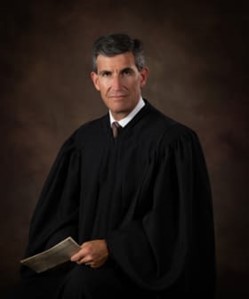By Eleanor H. Sills
Perhaps unsurprising from someone who is a self-described iconoclast, Judge Adam Tanenbaum is refreshingly unexpected. It’s not just his irreverent and enthusiastic attitude, or his incredible and seemingly unceasing drive to learn new things (so long as he can do so at a Starbucks—when we met he enjoyed a classic pumpkin spice latte with extra whipped cream). It is also that he does unexpected things like spending multiple hours each week either playing or refereeing soccer, and that he dislikes fixed things like formulaic legal writing and flag football.

Given this attitude, it comes as no surprise that he never expected to be an attorney. Until his junior year of high school, Judge Tanenbaum wanted to be a doctor, like his grandfather. He even recalls a childhood babysitter telling him that the obvious way for him to apply his math and science skills to make money was by working in the medical field. That all changed, however, when he visited Washington, D.C., with the Close Up Foundation and observed and learned about how the three branches of the federal government operated. Upon returning from his trip, he told his mom that rather than being a doctor, he wanted to be a lawyer. Although she denies it, he claims she replied, “Why waste your brain and be a lawyer?” He was undeterred—another of Judge Tanenbaum’s personality traits—and after graduating high school in 1989, he pursued a political science degree at the University of Florida, where he discovered his passion for political and legal history and philosophy.
In my speaking with Judge Tanenbaum about his career, his self-motivated autodidactic personality traits became clear. He built his reputation for hard work early on, something he has carried to the bench. For example, as a senior associate, when he became interested in appellate practice but was told he was too far along in his career to pursue this practice area, he purchased CLE cassette tapes with his own money so he could listen to them on his Walkman and learn from appellate judges, like then-Judge Canady, and Judges Altenbernd and Northcutt, at a local Starbucks (naturally).
Yet, despite his interest in appellate practice, the appellate bench was not an immediate goal for him. He described the idea as a fleeting thought or shimmer in the back of his mind. He credits his many mentors throughout his career for helping him along the way, especially Carlton Fields shareholders Chris Coutroulis and Don Schmidt, for knowing “how to handle” the brash and stubborn young lawyer he was (he claims the brashness has not fully gone away). They molded him into the lawyer that he became, teaching him professionalism and the importance of producing high-quality work every time.
When he was appointed to the First District Court of Appeal in November 2019 by Governor Ron DeSantis, this ethos remained. In talking about some of his favorite things about being a judge, he mentioned how being on the bench allows him to incorporate his writing and research skills and continue to serve and help the public in a new way. As he recently stated in his address to newly minted lawyers at the First District’s swearing-in ceremony, one’s license to practice law is a power and a privilege; but more than that, it is exciting and should be used to make a positive difference in the lives of others.
Judge Tanenbaum believes that the many, varied positions he held before becoming a judge (the number of past law jobs estimated to being over twenty) all helped his transition to an appellate judgeship. Each job exposed him to a different area of the law, and although fewer subjects are “new” to him these days, he is still constantly learning thanks to the diverse caseloads at the First District. When asked about his writing style, he cannot help answering like a lawyer: It depends! Sometimes it is best to include a lot of facts; sometimes it is unnecessary. In general, he dislikes formulaic writing because it discourages inquiry and creativity. Instead, he loves to tell a story and to make it relatable. He often writes to teach and to help the losing party understand why they lost. He laughs as he says this, noting that the winning side probably doesn’t care as much about the nuances of the opinion—They are just happy they prevailed.
Judge Tanenbaum likens his writing to soccer: The match unfolds in front of you, there are ebbs and flows, and mini-dramas in between. Every match, like every opinion, is different. For his opinions, he gets to do a lot of research, often citing old decisions—“The older, the better!” he says. This allows him to incorporate his passion for political and legal history, which he tries to rescue from the passage of time. And though Judge Tanenbaum’s writing stays within the boundaries of typical judicial opinions, it isn’t a surprise he also enjoys pushing those boundaries as far as he can.
What this adds up to is a judge who takes the work seriously, even if he never does the same for himself. He’s committed to being the same person now as he was before being a judge, which means enjoying a full life outside the courthouse. Judge Tanenbaum is a proud husband who enjoys getting takeout sushi with his wife (who is also a lawyer), a father to three kids (his eldest is in their first year at New College of Florida), an avid soccer player and referee, a self-professed “Swiftie,” and possibly one of the world’s first Starbucks Frappuccino testers. As for his favorite “open-road, convertible-top-down, wind-in-your-hair Taylor Swift jam song(s)?” Holy Ground, State of Grace, New Romantics, Cornelia Street, and King of My Heart—the last of which he fondly recalls blasting with his 16-year-old daughter on their way to a Lana Del Rey concert.
Like their father, both of his younger daughters play soccer locally. His favorite teams are, of course, his daughters’ teams. When asked about his refereeing hobby, he laughs and says refereeing and judging are very similar, except that while refereeing, soccer parents get to yell at him without much consequence.
Towards the end of our conversation, Judge Tanenbaum imparted these words of wisdom to young lawyers: Be fearless, and never accept no as a final answer. As Judge Tanenbaum observed, once someone swears you into The Florida Bar, you can appear and stand up for a client in every court in the state and practice nearly any type of law. While he believes that anyone who knows how to write, think, and work hard can be an appellate attorney, he cautions that the best practitioners never let themselves be outworked. The best ones eagerly seek feedback. Finally, he recommends aspiring to be the type of lawyer that other lawyers consistently seek out for counsel when they’re in need—a lawyer’s lawyer, known to be ever-faithful, ever-capable, and ever-dependable.
All in all, Judge Tanenbaum will keep you on your toes and is an excellent addition to Florida’s First District Court of Appeal.
About the Author: Eleanor H. Sills is an appellate attorney with Banker Lopez Gassler P.A. She also assists in the firm’s trial litigation support group. She previously clerked for the Honorable Ricky L. Polston of the Supreme Court of Florida and worked in the appellate division of the Agency for Health Care Administration. She is a member of the Florida Bar’s Appellate Practice Section and a barrister in the First District Appellate American Inn of Court.


